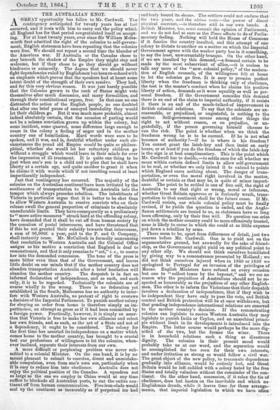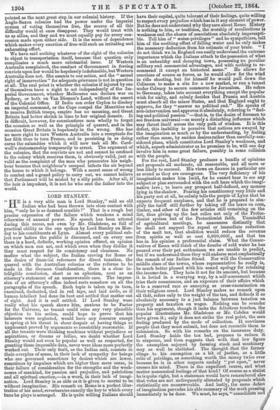A . two years, and the ultima ratio — the power of direct
GREAT opportunity has fallen to Mr. Cardwell. The for contingency anticipated for twenty years has at last physical coercion,—is therefore still in our own hands. A British Minister, too, must consult the opinion of Parliament, occurred, and it rests with him to carry out the policy which England has for that period congrat all congratulated itself on accept- and we do not feel so sure as the Times affects to do of Parlia- ing. For at least twenty years, ever since Sir William Moles- mentary feeling. Nothing will hold the House of Commons stay beneath the shadow of the Empire they might stay and welcome, but if they chose to go they should go without made by the most subservient of allies,—it is useless to hindrance or animosity. The dogma that we should never fight dependencies ruled by Englishmen has beenre-eohoedwith tion of English counsels, of the willingness felt at home an emphasis which proves that the speakers had at heart some to let the colonies go free. It is easy to promise perfect latent doubt of the strength of their own resolve. They had, liberty when the freedman is thinking only of obedience, and for this very obvious reason. It was just barely possible the test is the master's conduct when he claims his positive that the Colonies grown to the rank of States might vote liberty of action, demands as it were equality as well as per- themselves after much discussion, and many formalities, and sonal freedom. If the Government concedes this demand through their constitutional organs, free. In that case no one there is an end of the claim to imperial authority, if it resists distrusted the action of the English people, no one doubted it there is an end of the much-talked-of improvement in that after one brief pause of annoyed incredulity they would British colonial relations. To say that the colonists are un- let their children go. But it was much more Probable, almost reasonable, or prejudiced, or ungrateful, is nothing to the indeed absolutely certain, that the occasion of parting would matter. Self-government means among other things the not be a solemn conviction grown up within the colony, but right to act without reason, or on prejudice, or un- some incident, some quarrel, some difference large enough to gratefully, if the person governing himself chooses to rouse in the colony a feeling of anger and in the mother run the risk. The point is whether when we think the country one of humiliation. Hard words were sure to be freedman wrong he is to be coerced. If he is not what spoken, and it was, and is, doubtful whether under such cir. becomes of authority ?—if he is where is his freedom? tnmstances the proud old Empire would be quite so philoso You cannot grant the latch-key and then insist on early phieal, whether she would let her refractory children go hours, or at least if you do the freedom of which the latch-key without a struggle which would leave in their minds for ever is the sign is at best complimentary. This is the point which the impression of ill-treatment. It is quite one thing to be Mr. Cardwell has to decide,—to settle once for all whether we just when one's son is a child and to plan that he shall have mean within certain defined limits to allow self-government liberty at a certain age, and quite another to grant it when to be real, or whether we only intend it to extend to points he claims it with words which if not insulting sound at least which England cares nothing about. The danger of trans- impertinently independent. • portation, or even the moral right involved in the matter, Just that contingency has occurred. The majority of the colonies on the Australian continent have been irritated by the ance. The point to be settled is one of free will, the right of continuance of transportation to Western Australia into the Australia to say that right or wrong, moral or infamous, temper which always precedes rebellion. The inhabitants of whether Great Britain approves or is furiously wrath, trans- Victoria in particular argue that it is better to be shot than portation to that continent shall for the future cease. If Mr. to allow Western Australia to receive convicts who on their Cardwell resists, our whole colonial policy must be finally release swell the general proportion of criminals to absolutely revised, if he yields the question is ended, and the Anglo- unendurable limits. They have consequently as a preliminary Saxon settlements are bound to us, as statesmen have so long been affirming, only by their free will. No question can arise to." more active measures" struck hard at the offending colony, on which the mother country could be more offensively treated, have demanded that it shall be cut off from human society by none is likely to occur in which she could at so little expense the cessation of postal intercourse, and have threatened that if this be not granted their subsidy towards that intercourse, put down a rebellion by arms. a sum of 36,000/. a year, paid to the P. and 0. Company, a foreign power. Practically, however, it is simply an asser ever inclined, separate their interests from our own. THE AUSTRALIAN SNOT. sucl.lenly bound its shoves. The settlers could not endure that i if we are insulted by this demand,—a demand certain to be talk any more of the "new. colonial policy," of the modern- doubtful or certain as that may be, is quite of minor import- There seem to be, apart from differences of detail, just two . colonies can legislate to coerce Western Australia they may tion that Victoria is free to make her own alliances and select legislate to punish India or Ceylon, and an anarchical princi- her own friends, and as such, as the act of a State and not of pie without limit in its developments is introduced into the a dependency, it ought to be considered. The colony for Empire. The latter course would perhaps be the more dig- the first time has asserted its independence on a matter which Iliae . of the two, but the former the wiser. There tomes home to the mother country, has brought to a crucial is in household relations such a thing as disastrous test our professions of willingness to let the colonies, when- dignity. The colonies in their present mood would probably take us at our word, and the separation would A. more difficult or perplexing problem was never sub_ be accomplished far too soon for their own interests, mitted to a colonial Minister. On the one hand, it is by no and under irritation as strong as would follow a civil war. meads pleasant to submit to coercion, direct and unmistake- The great object of the new policy, to transmute dependence able compulsion, even from one's own son, particularly when gradually into alliance, would be entirely lost, and Great it is easy to reduce him into obedience. Australia does not Britain would be left saddled with a colony hated by the free enjoy the political position of the Canadas. A squadron not States and totally valueless without the remainder of the con- so large as the one we employ in China would at any time tinent. On the other hand, concession, if it relax the tie of suffice to blockade all Australian ports, to cut the entire con- obedience, does but hasten on the inevitable end which no tineut off from human communication. Five iron-clads would Englishman dreads, while it leaves time for those arrange- seal up the continent as inexorably as if perpetual ice had ments, that imperial legislation to which we have often pointed as the next great step in our colonial history. If the Anglo-Saxon colonies had the power under the imperial system. of voting themselves free, the source of all this difficulty would at once disappear. They would treat with us as allies, and they and we must equally pay for every con- cession made upon either side. It is the sense of dependence which makes every exertion of free-will such an irritating and exhausting effort. We have said nothing whatever of the right of the colonies to object to transportation itself, because that question only complicates a much more substantial issue. If Western Australia complained, the conduct of Government in forcing convicts upon her would be hopelessly indefensible, but Western Australia does not. She assents to our action, and the "sacred right of insurrection" for adequate grievance is not in question at all. The real point is whether the colonies if injured by one of themselves have a right to act independently of the Im- perial Government, whether Melbourne can declare war on Sydney, or both on Van Diemen's Land, without the assent of the Colonial Office. If India can order Ceylon to disobey an imperial command, or the Cape compel the Mauritius not to receive British troops, empire has no meaning, and Great Britain had better shrink in time to her original domain. It is difficult, however, for conscientious men wholly to forget the occasion as well as the principle of quarrel, and in the occasion Great Britain is hopelessly in the wrong. She has no more right to turn Western Australia into a receptacle for her filth than to turn France, and in persisting in so doing earns the calamities which it will now task all Mr. Card- well's statesmanship temporarily to arrest. The argument of the colonies, that the convicts are not and cannot be confined to the colony which receives them, is obviously valid, just as valid as the complaint of the man who prosecutes his neigh- bour because that neighbour's cesspool infects the air beyond the house to which it belongs. With a secret sense of wrong to combat and a grand policy to carry out, we cannot believe that Parliament will be misled by a silly pride. After all, if the heir is impudent, it is not he who sent the father into the world.































 Previous page
Previous page